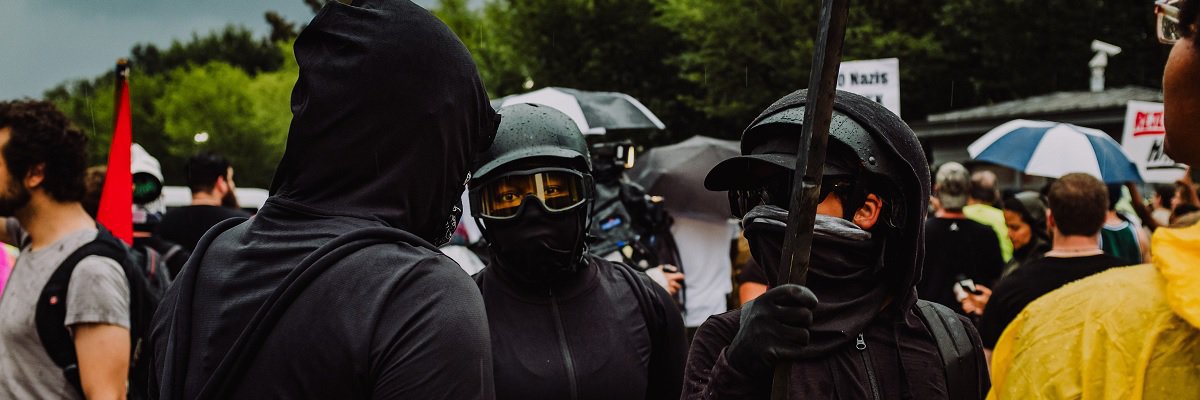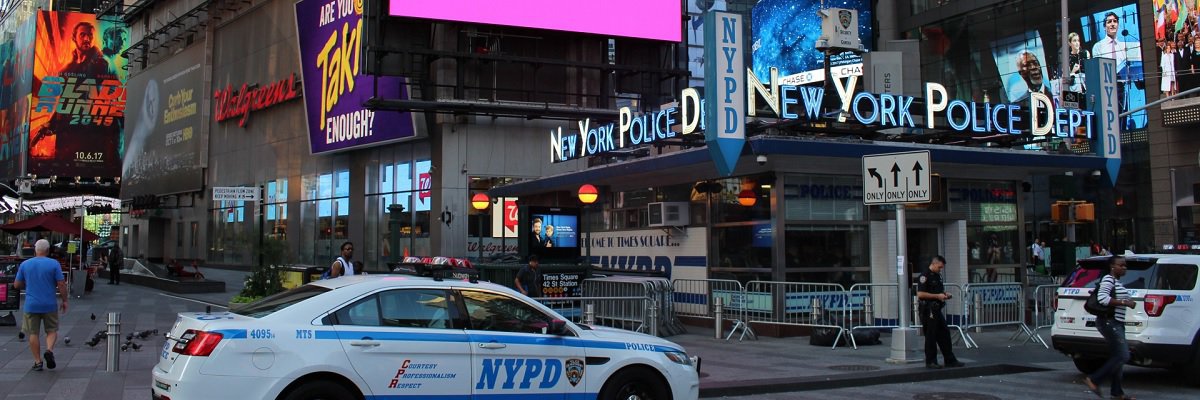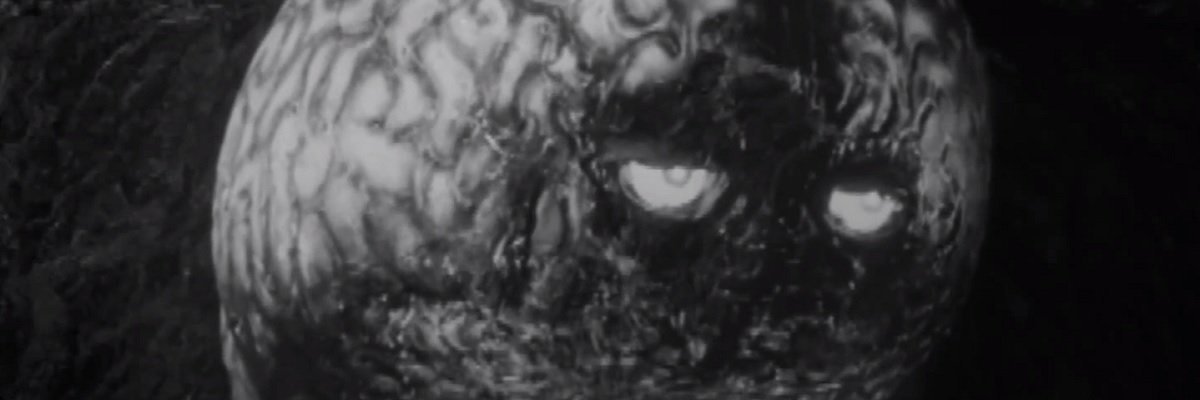Last September, a Facebook event caught the eye of a counterrorism specialist within the Texas Department of Public Safety.
“New event just posted,” she emailed to several colleagues, along with a link to the public posting.
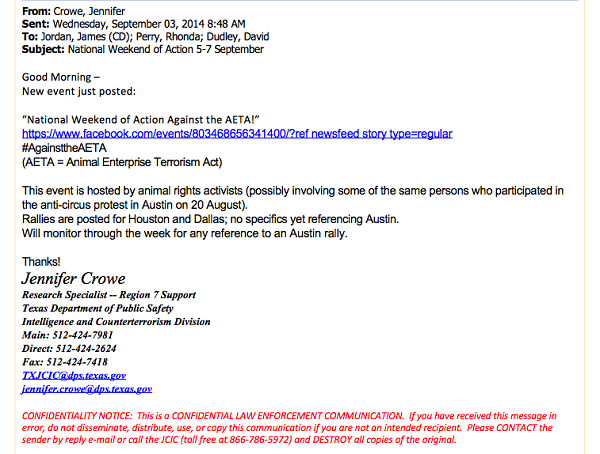
The email was among those released by the Austin Regional Intelligence Center (ARIC) last month. This same release revealed that ARIC took stock of potential anti-circus demonstrators in 2012, and also passed around a private citizen’s social media posts on the basis that such information is “open source.”
The Facebook page of interest to Texas DPS was the hub for animal rights events to take place across the country over the first weekend of September. All events surrounding this “National Weekend of Action” were organized to oppose the Animal Enterprise Terrorism Act (AETA).
The counterrorism specialist noted that the event “is hosted by animal rights activists” and surmised that some of the organizers might also have participated in a recent “anti-circus protest in Austin.” While events were posted for Dallas and Houston, the Austin-based counterterrorism researcher vowed to “monitor through the week for any reference to an Austin rally.”
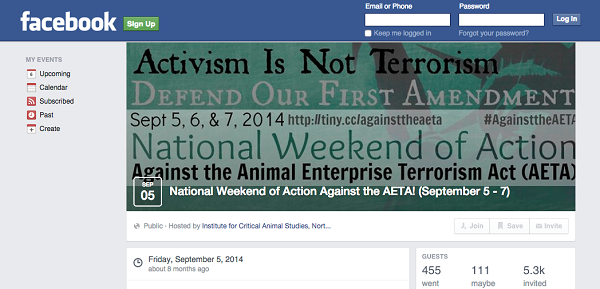
Ironically, it was this very monitoring that riled the event’s national organizers to action.
“The National Weekend of Action Against the Animal Enterprise Terrorism Act (AETA) entails talks, workshops, film viewings, protests, etc.,” reads the event’s posted description, “to educate the public about federal laws that specifically target animal advocates whose work attempts to stop a person or company from profiting from the use of nonhuman animals (which could include nearly all types of non-reformist activism, from protests to liberatory actions).”
Organizers encouraged activists to host their own events with an anti-AETA focus. Their suggestions included hosting a potluck, a film screening, or a teach-in “on why dissent is not terrorism.” The most dramatic suggestions were to stage a protest on federal property or to organize “a banner drop off a bridge.”
The linked Houston event, for instance, was a screening of Princess Mononoke to be hosted at Rice University. The Dallas event featured a snack table, know-your-rights literature and videos that address AETA’s impact on environmental and animal rights activists.
Given the overall tame tenor, it’s unclear how such a post came across a counterterrorism specialist’s desk, or why it merited sharing.
When asked about how the agency monitors such events, a Texas DPS spokesperson pointed to its privacy policy. This policy explicitly prohibits collecting information about individuals or organizations solely based on participation “in a particular non-criminal organization or lawful event,” or on the basis of political or social views.
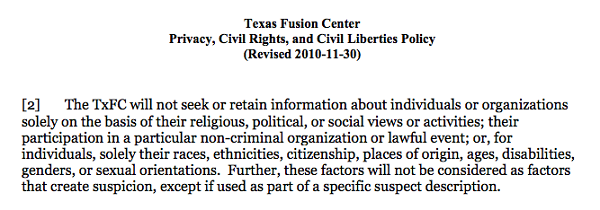
Texas DPS did not answer specific questions regarding how last fall’s AETA events came to the counterterrorism specialist’s attention, or what other events the department looks for via social media.
The rest of the September 2014 email chain indicates that the event page was shared beyond Texas DPS. An officer at the Austin Regional Intelligence Center also received a FYSA (“For Your Situational Awareness”).
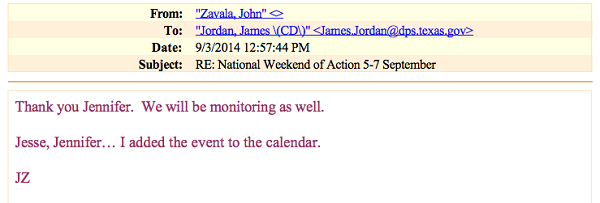
“We will be monitoring as well,” the ARIC officer wrote back, elaborating that he had “added the event to the calendar.”
The privacy policy for ARIC similarly limits collection of information on individuals and organizations. Collected information must relate to terrorism, criminal activism or a threat to public safety. As under the Texas DPS privacy policy, ARIC officers cannot collect information based on political views or event participation.

An Austin police spokesperson declined to answer questions regarding the calendar that the ARIC officer referenced. But she indicated that ARIC officers review social media in search of “bad actors.”
“The ARIC is tasked, from an all-crimes perspective, with keeping the citizens of Austin and the surrounding communities safe,” wrote Anna Sabana in response to emailed questions. “As part of this mission, the ARIC will examine unrestricted, publicly available social media solely with the intent of looking for bad actors that would cause harm.”
“If the ARIC personnel discover social media posts that are threatening or designed to incite violence or cause an official response, they are prepared to further investigate those or refer them to the proper investigative unit or agency.”
Sabana likewise declined to answer questions as to how ARIC officers triage information gleaned from social media to determine whether it merits further investigation or referral.
Since their establishment following the September 11 attacks, many have questioned how much fusion centers such as ARIC actually strengthen homeland security. A 2012 Senate committee report cataloged a number of issues with fusion center intelligence collection and reporting.
“You would have some guys, the information you’d see from them, you’d scratch your head and say, ‘what planet are you from?’” complained one official who was interviewed by subcommittee investigators.
The ARIC officer did not draft any situational awareness memos or reports regarding the AETA events, according to the Austin police spokesperson. An ARIC bulletin from January 2012 regarding Occupy Austin indicated that much of the agency’s information came from social media monitoring.
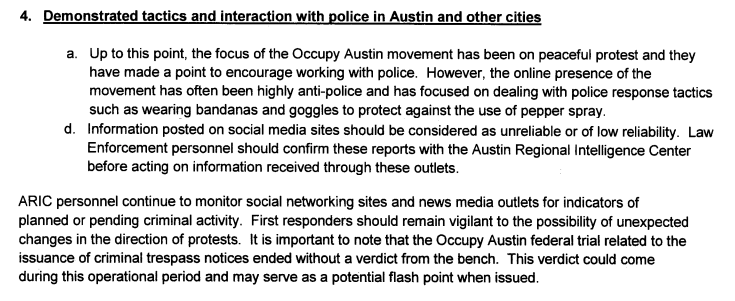
Interestingly, in the case of Occupy Austin, ARIC officers noted that social media information “should be considered as unreliable or of low reliability.”
It remains unclear what tools the Texas Department of Public Safety and the Austin Regional Intelligence Center use to collect and analyze social media information, as well as the metrics by which officers assess such data.
MuckRock is continuing to explore the role that social media plays in modern policy, and particularly the many open questions regarding appropriate policies and practices.
Image via Wikimedia Commons and and is licensed under CC BY 2.0


